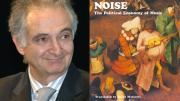Nearly 40 years after the publication of his 1977 book Noise: The Political Economy of Music, French economist and writer Jacques Attali spoke at Harvard on Monday about the relationship between music and a society’s economic structure. “Music is a metaphor for society,” said the founding president of the European Bank for Reconstruction and Development and one-time adviser to former French president François Mitterand. “Noise is a violence, and music is a way of taming violence.” The lecture, “Music as a Predictive Social Science”—the last of the 2013-2014 Sawyer Seminar series Hearing Modernity—considered both the historical progression of music and its diverse visions of the future.
Music is deeply entwined with modes of production and can predict major societal transformations, argued Attali, who is also a musician and occasional conductor. Consider, for instance, the invention of gramophones and other recording devices in the late nineteenth century, which allowed music to be mass-produced. Previously, the economic model of music had centered on concerts, with musical performance bought and sold as a commercial product. By contrast, said Attali, recordings transformed the role of music in society: with all records the same price, the value of music derived instead from arbitrary rankings and measures of popularity. “The price of records cannot be their differentiation,” he observed. “That was the beginning of the end of the market economy.”
Music not only reflects but predicts social transformation, he asserted, and in 1977, he duly made forecasts of his own. His main prediction of a new human phase of composition, in which individuals create and enjoy their own music and “production melds with consumption,” has been borne out by the rise of social media and digital music. Building on that prediction on Monday, he declared, “Music is more and more a mixture. If you look at the role of DJs, there is no distinguishing who is what…It is the beginning of the end of property rights.” In place of recordings, he predicted a return to live performance. “People will continue to pay a very high price for concerts, but they will not pay anything, anymore, for records,” he said. “The real thing that people will pay for is time.”
In conclusion, Attali sketched several competing visions of the future. He warned against what he termed “ethnomodernity”—a resurgence of nationalism, both in music and in politics, that would impede the progress of globalization—and likewise cautioned against a “retromodernity” born out of nostalgia for times past. He ended by articulating his hope for a form of modernity built on altruism and on what he described as the economy of the gift: “sharing music…making music with others, learning the joy of making the other happy.”
Read about an earlier lecture from the Sawyer Seminar that explored the physical basis of sound.








